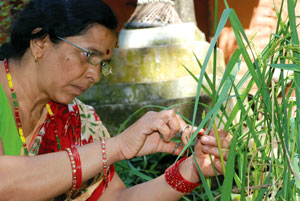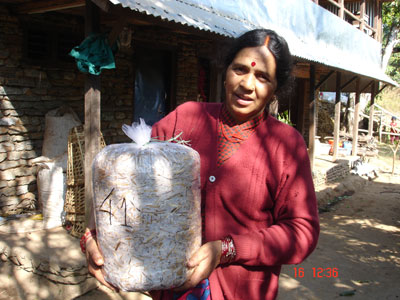 ALL PICS: LIBIRD KNOWLEDGE FARM: Saraswati Adhikari cross-pollinates rice stalks in her farm in Kaski to improve her crops and preserve agricultural biodiversity. She shares this knowledge with farmers and volunteers from Nepal and abroad. The award-winning farmer has produced seven new varieties of rice. |
The knowledge of the seasons and the weather, seeds and their planting times, the herbs and fruits in the surrounding forests all come naturally to her. Saraswati cannot read or write, and she learnt these things from her parents and in-laws who themselves got the knowledge from their parents.
Today Saraswati is not just a source of knowledge for farmers in Kaski, but from various other parts of Nepal and even foreigners. More than 130 trainees from different corners of the world visit Saraswati's farm overlooking Begnas Lake every year to learn about organic farming, agro-biodiversity, and permaculture. With her husband, Surya, she grows 160 plant species like medicinal herbs, rice, vegetables, and fruits, including the less common ones such as coffee, kiwi, and avocado in her hillside farm. Saraswati gives full credit to the Pokhara-based organisation, LIBIRD (Local Initiatives for Biodiversity, Research, and Development), a non-profit that seeks to conserve local biodiversity so farmers can benefit. Saraswati and Surya took part in a LIBIRD training 15 years ago where they learnt about using the rich plant life of the surrounding mountains to breed new crop varieties and preserve locally-adapted seeds.
Today, Saraswati's farm not only meets the needs of her family, but also serves as a learning centre where visitors can rent rooms as part of a homestay program to gain knowledge about organic farming.
 Saraswati Adhikari in her coffee farm. |
"I am very happy and satisfied now that I have become more famous," Saraswati laughs, half-mocking herself. She is encouraged by people from other parts of Nepal and overseas calling her on her mobile to acknowledge her efforts, and ask for advice on vermiculture or coffee production of which the couple are pioneers in Nepal.
Most foreigners come from the US and UK and depending on the season up to 10 volunteers stay at the farm every month to help with chores and learn organic farming techniques, or get first hand experience in coffee planting and processing."My biggest satisfaction is that I am able to share my knowledge and learning with my visitors, and let them take the knowledge back to farms in their own homes," she says.
Besides conserving agricultural biodiversity, she and her husband have also successfully improved local varieties of rice by cross-breeding. With the support of scientists from LIBIRD and other groups, Saraswati's farm has produced up to seven improved varieties of rice, including the famous Pokhareli Jethobudo which is favoured by consumers for its soft texture, unique aroma, and taste.
As the breeding process requires intense concentration, Saraswati has taken over the role from her husband as his eyesight is failing, and his hands are not dexterous enough for crossing rice stamens. In 2010, Saraswati was given the Best Innovative Farmer Breeder by LIBIRD.
As a result of their hard work, the family income has tripled from the increased harvests and from renting rooms to homestay guests and volunteers. The Adhikaris have therefore been able to afford to send their son abroad for studies.
At a time when Saraswati and her husband should be thinking of retirement and enjoying the fruits of their lifelong work, the couple is brimming with new ideas. Although she cannot read or write herself, Saraswati's dream is to set up an agricultural college in Kaski to help other farmers preserve their traditional farming knowledge from disappearing forever.
Says Saraswati: "As long as my eyes, ears, and hands can support me, I will continue to do my best and pass on what I know to a new generation."
See also:
Earning from nature to pay for its upkeep, KUNDA DIXIT in KASKI
Unique cooperative puts a price tag on protecting the ecosystem


